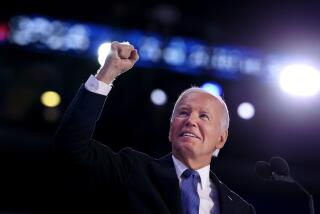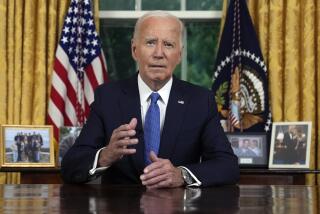Biden in Race, Cites Difficult Path to Future
- Share via
WILMINGTON, Del. — Sen. Joseph R. Biden Jr. formally announced his presidential candidacy Tuesday, vowing to lead Americans down “the difficult path” of protecting their children’s future.
“This is the issue upon which I will stake my candidacy,” the Delaware Democrat said of his contention that the nation must choose between “our current comfort” and its responsibility to the younger generation.
Addressing an outdoor rally of about 2,000 hometown friends and supporters gathered under cloudy skies in front of this city’s aged rail terminal, Biden warned that “if we follow the easy path” to the future, “devouring the seed corn of our children, we will deliver to them a lesser America.”
“Every issue before this nation must be measured against our obligation to our children,” Biden contended. Wearing a gray suit and red tie, both hands firmly gripping the lectern most of the time, Biden went on to tick off a series of major problems that he said must be approached with the welfare of young people in mind.
Speaking of the trade deficit, Biden warned against both the “naivete of free traders” and “the morally bankrupt” response of protectionism. He said the nation must “totally refashion” its school system and asserted that “shortsighted profiteering” by polluters can no longer be tolerated.
“We cannot succumb to the isolationist instincts of those who would put up trade walls to keep out the world or others who would pull a ‘Star Wars’ cover over our heads--a modern Maginot line--ravaging our economic capital, nuclearizing the heavens and yielding the fate of our children’s world to the malfunction of a computer,” he said.
Plight of Children
“No problem in our country is more urgent and more critical than the physical and moral plight of our children at this moment,” Biden declared. He said that an American inner-city infant has less chance of surviving its first year than a child born in Cuba or Kuwait.
Biden’s announcement speech presented no detailed solutions. But last month, in a major speech on impoverished children, he called for free health care for poor children, doubling the size of Head Start and changes in welfare and tax laws to strengthen family ties.
By giving such prominence to the welfare of children, aides said, Biden was trying to present a major new theme for his candidacy, which has been struggling to find its footing in the early stages of the 1988 campaign.
The major evidence of Biden’s difficulties, cited by strategists for opponents but also some independent analysts, is his inability to make any headway in public opinion polls, although he has barnstormed intensely around the country this year and gained endorsements of many prominent elected and party officials.
Ordinarily, poll results are not taken seriously at this point in a presidential campaign, eight months before the actual delegate selection process begins in Iowa. But they are being given more attention in this quadrennial, by press and politicians alike, because many people believe that the nominating process has been speeded up in general by the wide-open Democratic race and the acceleration of the delegate selection timetable.
Another factor influencing assessments of Biden’s candidacy is that his rhetoric is so high-powered--only the Rev. Jesse Jackson among his Democratic rivals can match him--that it builds expectations he is having trouble meeting.
Biden joked about his perceived difficulties on the special train carrying his entourage and reporters from Wilmington to Washington, where he made another announcement speech before heading off by plane for a three-day, three-state campaign swing. He suggested facetiously that if pollsters surveyed the sizable crowd that cheered his announcement speech, his ratings would double.
“There are some problems that have to be dealt with and some changes that have to be made,” said one Biden aide who chose not to be identified.
“We have spent a lot of time recruiting chiefs,” said Ed Theobold, Democratic national committeeman from New Hampshire, who is supporting Biden’s candidacy. “Now we need to get some Indians.” Theobold is one of three New Hampshire committee members--there are a total of four--backing Biden.
Biden also has the backing of a number of prominent Democrats in Iowa, and his national campaign is co-chaired by Sen. Daniel K. Inouye of Hawaii, chairman of the Senate select committee investigating the Iran- contra scandal, and House Judiciary Committee Chairman Peter W. Rodino Jr. of New Jersey.
Inouye took Tuesday morning off from the Iran-contra hearings to be by Biden’s side for his announcement in Wilmington. “I left Fawn Hall in Washington to be here with Joe Biden,” Inouye quipped.
But some professionals not affiliated with the Biden campaign said its problems are more fundamental than the time spent trying to draw well-known Democrats into the fold. They said that Biden’s early difficulties, such as they are, reflect his emphasis on broad themes and emotional appeals rather than substantive programs.
And they blame this tendency in part on the influence of pollster Patrick Caddell, a close Biden friend. Biden says he relies on Caddell only for tactical advice, but others say many of the themes articulated in Biden’s speeches are similar to those propounded by Caddell in various memoranda he has written and circulated.
Caddell acknowledged contributing to Biden’s announcement speech, although when asked about that by a reporter, he said: “Only a little bit.”
Whatever the extent of Caddell’s role, Biden’s strategists are hoping that his announcement speech will rebut criticism of his rhetoric.
“He has been hammering away at the generational theme,” said Larry Rasky, the campaign’s communications director, referring to the 44-year-old Biden’s efforts to depict himself as the spokesman for the baby boomers. “Now he is trying to spell out what this generation’s responsibility is.”
The needs and concerns of children is a natural issue for Biden because of his own personal history. His first wife was killed in an auto accident, in which his two sons were also injured, shortly after his election to his first Senate term in 1972. Biden, who has since remarried and fathered a daughter, has maintained his home in Wilmington and commutes here every night.
Inouye referred to Biden’s response to that tragedy in introducing the candidate. “That’s fatherhood, that’s family,” Inouye said. “This nation needs a President with a family.”
Biden’s speech in Washington, a few hours after his initial announcement in Wilmington, was an attempt to remind voters of his long experience on Capitol Hill.
Some critics have contended that Biden has had few substantial achievements in Congress, where most of his energies have been spent on the Judiciary Committee, which he now chairs, and on the Foreign Affairs Committee, where in 1979 he led the unsuccessful fight for ratification of the second strategic arms limitation treaty and has been a vocal critic of Administration policy toward South Africa.
Biden, addressing several hundred persons in the rotunda of the Russell Senate Office Building, referred to that building as his “home away from home” and to the Capitol across the street, where Congress meets, as “my school.”
He added: “Here I have been professionally preparing for the journey I begin today.” SEN. JOSEPH ROBINETTE BIDEN JR.
Born: Nov. 20, 1942, Scranton, Pa.
Parents: Joseph Robinette Biden Sr., an auto dealership manager, and Jean Finnegan Biden.
Education: BA, history and political science, University of Delaware. JD, Syracuse University.
Military Career: None.
Professional Career: Private law practice, 1968-72. Member, New Castle (Del.) County Council, 1970-72. Elected to U.S. Senate, 1972. Last reelected in 1984 with 60% of vote.
Family: Wife, Jill Tracy Jacobs; daughter, two sons.
Religion: Roman Catholic.
Accomplishments: Chairman, Senate Judiciary Committee. Leading proponent in 1972 Senate Foreign Relations Committee debate of the strategic arms limitation treaty. Major architect of comprehensive revision of criminal code in 1984. Author of “graymail” law cracking down on former government officials who threaten to divulge national security secrets if prosecuted on criminal charges.
Positions: Against aid to Nicaraguan rebels. For middle-road trade protection measures. For Hyde Amendment ban on federal funding of nearly all abortions, against constitutional ban on abortion. Against early deployment of “Star Wars” missile defense system. For revenue increases such as higher excise taxes on liquor and tobacco to reduce deficit but against income tax hikes. For expanding student loan program to include working adults, with paybacks drawn from up to 5% of postgraduate income. For an oil import fee that triggers off when oil prices hit $20 a barrel.
Strengths: Dynamic, colorful orator. Adept at brokering solutions to legislative impasses. Good sense of humor. Extensive network of contacts developed from speaking for numerous candidates across the country. Generally liberal record but anti-busing background may appeal to party conservatives.
Vulnerabilities: Small-state base. Little known nationally. Rambling speeches. Jumps from issue to issue. Heavy-handed manner.
More to Read
Get the L.A. Times Politics newsletter
Deeply reported insights into legislation, politics and policy from Sacramento, Washington and beyond. In your inbox twice per week.
You may occasionally receive promotional content from the Los Angeles Times.










